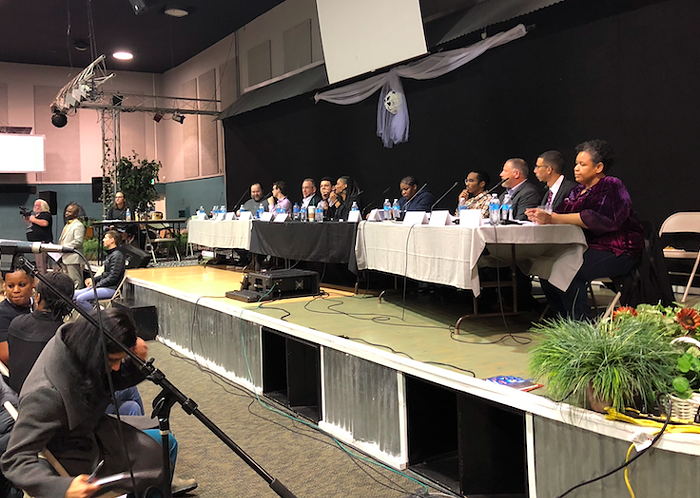
Portland's newest police oversight board is in session.
Last night marked the inaugural meeting of the Portland Committee on Community-Engaged Policing (PCCEP), a 13-member group tasked with reviewing the federally mandated reforms the Portland Police Bureau (PPB) must make to improve its interactions with people in mental health crises.
"I am very clear that this is the huge night," said PPB Chief Danielle Outlaw, addressing the commission and the 60 community members who came out to watch the Wednesday meeting. Outlaw showed gratitude—and relief—to see the long-anticipated commission hold its first meeting.
"Thank you so much for your time and your commitment," she said. "If you don't know, it'll probably be a lot. It's not a lot volume-wise, it's a lot because of what's asked of you and the value and the work that you're doing."
PCCEP is the latest step the city's made toward meeting the requirements laid out in Portland's 2014 settlement agreement with the US Department of Justice (DOJ). And the city and police bureau really needs it to stick.
The DOJ settlement was reached after federal investigators found, in 2012, that Portland police officers disproportionally used force against people in mental health crises. The settlement between the city and the feds mandates a number of detailed reforms to PPB, and requires the city create a community group to oversee PPB's rollout of the agreed-upon reforms.
Thus, the city created the Community Oversight Advisory Board (COAB), a 15-member group made up of police reform advocates, attorneys, and police officers.
But infighting between police and activists, disruptions from the public, and general neglect from city hall led to COAB's quick demise. Portland City Council pulled the plug on COAB in late 2016, leaving the city out of compliance with its settlement agreement for nearly two years.
PCCEP (pronounced pee-sep) is Portland's second attempt at meeting this community oversight requirement. As the group's architects, Mayor Ted Wheeler and his staff members have laid out the group's directives and hand picked the 13-member committee (which this time, does not include cops). That leadership changed hands at Wednesday's meeting.
"This panel will be independent—they will determine where they go, they will determine their agenda, they will determine how they govern themselves, they will determine their own North Star," said Wheeler, before the meeting began. "My job was to get it to this point... but this will be their show."
While Nicole Grant, Wheeler's senior policy advisor, will continue to be the city's liaison to PCCEP, she reassured commission members Wednesday that she would only act as a direct line to Wheeler's office and not interfere in any decision-making.
Despite the years of anticipation hanging on PCCEP's success, Wednesday night's meeting followed the ordinary script of any committee gathering for the first time. Members voted on PCCEP's bylaws, and added a few amendments to cement the group's independence, guarantee the city doesn't leave seats empty for too long (one of COAB's flaws), and clarify the city's financial promises (a monthly stipend of $120 per member). The monthly meetings will be open to the public.
Members also selected their co-chairs: LaKeesha Dumas, a community health care worker with Multnomah County's mental health and addiction services division, and Lakayana Drury, a high school social studies teacher and founder of "Word is Bond,'' a group formed to improve relationships between young Black men and law enforcement.
"This board is much more than a settlement agreement, I believe it is the way we interact in the community," said Drury. "It is how we interact as citizens, as officers, and as neighbors. With PCCEP we have the opportunity to reframe policing policies [and] we have the opportunity to authentically engage the community."
The meeting included a presentation by Davis, Hibbitts & Midghall Inc., a local research company that's been hired by the city to survey Portlanders on how PPB interacts with the public. After detailing how their company conducts randomized surveys, yet still sees a unequal number of white people returning their surveys, a number of PCCEP members raised concerns about the true diversity of those surveyed.
“You have not heard enough from the people who these issues probably matter to most,’’ said member Michele Lang, an administrator at Warner Pacific University. Lang was selected to be PCCEP's secretary at the Wednesday meeting.
"One of the themes I've heard throughout the night is the need to really incorporate other groups of people [in PCCEP's work]," said Drury. "Not only reach out to them but make sure they're heard."
All members agreed that the overarching focus of the committee was to hear from the city's most marginalized communities—whether that be people with a mental illness, people of color, people without a home, or youth. Many of PCCEP's members represent those communities.
"I have an African-American son with mental illness and I have mental illness," said Dumas. " So I'm coming at this [not] from a lens of sympathy, but empathy. My son is under fire. If I'm not pushing because of my personal involvement, I'm not sure who could push harder than that."



















